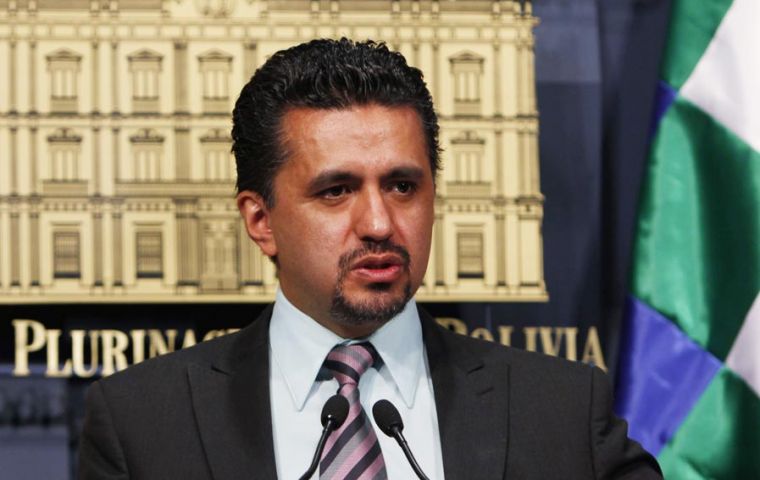MercoPress. South Atlantic News Agency
Bolivia’s Interior minister steps down and controversial jungle road is suspended
 Sacha Llorenti admits police brutality and becomes second minister to resign
Sacha Llorenti admits police brutality and becomes second minister to resign Bolivia's Interior minister and his Deputy resigned Tuesday after mounting recriminations over a violent police crackdown on marchers opposed to a jungle highway that they say would despoil an indigenous preserve.
Interior Minister Sacha Llorenti became the second Cabinet member to step down over the weekend action which backfired as angry crowds’ pressured police into releasing the hundreds of protesters they had detained.
Defence Minister Cecilia Chacon resigned in protest immediately after Sunday's crackdown by about 500 police officers who fired tear gas and wielded clubs in the eastern lowlands.
The backlash is a major setback for President Evo Morales, who by stubbornly insisting on the 300-kilometer jungle highway had alienated many of his indigenous core supporters in this poor, landlocked nation where more than two in three people are members of indigenous groups.
Morales announced Monday that he was suspending the Brazil-funded highway and leaving it to voters in the two affected regions to decide its fate.
Llorenti had initially defended the crackdown and denied excessive force was used. But before resigning on Tuesday he said neither he nor Morales had ordered the police against the marchers. He blamed Deputy Minister Marcos Farfan, who resigned to take responsibility but also denied ordering the police action.
The director of Bolivia's migration agency, Maria Rene Quiroga, resigned Tuesday to protest the break-up of the march by some 2,000 people, including whole families, who departed the provincial capital of Trinidad in mid-August on foot bound for the highlands capital of La Paz.
It was not clear how many people were injured or how seriously during Sunday's clash. First reports following the police attack said a baby had been killed and 37 people were missing including seven children. However it seems many took refuge in the rain forest when police fired tear gas and moved on marchers.
Morales has been an impassioned champion of the campaign to curb global warming but is seen as less environmentally friendly at home for insisting on building the highway through the 12,000-square-kilometer Isiboro-Secure Indigenous Territory National Park. It is home to 15,000 indigenous people who live off hunting, fishing, gathering fruit and subsistence farming.
Park inhabitants fear the road would bring an influx of settlers who would destroy their habitat by felling trees and polluting rivers. Environmentalists say the road would mostly benefit Brazilian commercial interests such as timber exporters while endangering a pristine nature preserve.
The road crossing the Indigenous reservation is part of a Brazilian project to link the Atlantic and Pacific oceans
Morales, an Aymara Indian who is Bolivia's first indigenous president, has been fiercely criticized as turning a deaf ear to those who re-elected him by a landslide in 2009. The president, who is also leader Bolivia's coca growers union, has seen his support in opinion polls fall to 37%, its second-lowest level since he was first elected in 2006.




Top Comments
Disclaimer & comment rules-

Read all commentsEvo Evo, what's wrong with you dude? your indigenous people just love you! no? not anymore? :)
Sep 29th, 2011 - 01:06 am 0Commenting for this story is now closed.
If you have a Facebook account, become a fan and comment on our Facebook Page!